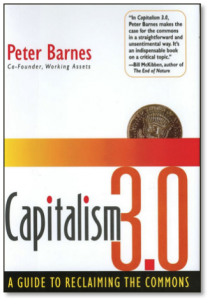Capitalism 3.0

I’M A BUSINESSMAN. I believe society should reward successful initiative with profit. At the same time, I know that profit-seeking activities have unhealthy side effects. They cause pollution, waste, inequality, anxiety, and no small amount of confusion about the purpose of life.
I’m also a liberal, in the sense that I’m not averse to a role for government in society. Yet history has convinced me that representative government can’t adequately protect the interests of ordinary citizens. Even less can it protect the interests of future generations, ecosystems, and non-human species. The reason is that most—though not all—of the time, government puts the interests of private corporations first. This is a systemic problem of a capitalist democracy, not just a matter of electing new leaders.
If you identify with the preceding sentiments, then you might be confused and demoralized, as I have been lately. If capitalism as we know it is deeply flawed, and government is no savior, where lies hope?
This strikes me as one of the great dilemmas of our time. For years the Right has been saying—nay, shouting—that government is flawed and that only privatization, deregulation and tax cuts can save us. For just as long, the Left has been insisting that markets are flawed and that only government can save us. The trouble is that both sides are half-right and half-wrong. They’re both right that markets and state are flawed, and both wrong that salvation lies in either sphere. But if that’s the case, what are we to do? Is there, perhaps, a missing set of institutions that can help us?
I began pondering this dilemma about ten years ago after retiring from Working Assets, a business I co-founded in 1982. (Working Assets offers telephone and credit card services which automatically donate to nonprofit groups working for a better world.) My initial ruminations focused on climate change caused by human emissions of heat-trapping gases. Some analysts saw this as a “tragedy of the commons,” a concept popularized forty years ago by biologist Garrett Hardin. According to Hardin, people will always overuse a commons because it’s in their self-interest to do so. I saw the problem instead as a pair of tragedies: first a tragedy of the market, which has no way of curbing its own excesses, and second a tragedy of government, which fails to protect the atmosphere because polluting corporations are powerful and future generations don’t vote.
This way of viewing the situation led to a hypothesis: if the commons is a victim of market and government failures, rather than the cause of its own destruction, the remedy might lie in strengthening the commons. But how might that be done? According to prevailing wisdom, commons are inherently difficult to manage because no one effectively owns them. If Waste Management Inc. owned the atmosphere, it would charge dumpers a fee, just as it does for terrestrial landfills. But since no one has title to the atmosphere, dumping proceeds without limit or cost.
There’s a reason, of course, why no one has title to the atmosphere. For as long as anyone can remember there’s been more than enough air to go around, and thus no point in owning any of it. But nowadays, things are different. Our spacious skies aren’t empty anymore. We’ve filled them with invisible gases that are altering the climate patterns to which we and other species have adapted. In this new context, the atmosphere is a scarce resource, and having someone own it might not be a bad idea.
But who should own the sky? That question became a kind of Zen koan for me, a seemingly innocent query that, on reflection, opened many unexpected doors. I pondered the possibility of starting a planet-saving, for-profit, sky-owning business; after all, I’d done well by doing good before. When that didn’t seem right, I wondered what would happen if we, as a society, created a trust to manage the atmosphere on behalf of future generations, with present-day citizens as secondary beneficiaries. Such a trust would do exactly what Waste Management Inc. would do if it owned the sky: charge dumpers for filling its dwindling storage space. Pollution would cost more and there’d be steadily less of it. All this would happen, after the initial deeding of rights to the trust, without government intervention. But if this trust—not Waste Management Inc. or some other corporation—owned the sky, there’d be a wonderful bonus: every American would get a yearly dividend check.
This thought experiment turned into a proposal known as the sky trust and has made some political headway. It also served as the epicenter of my thinking about the commons, which led to this book.
 Free distribution with attribution
Free distribution with attribution